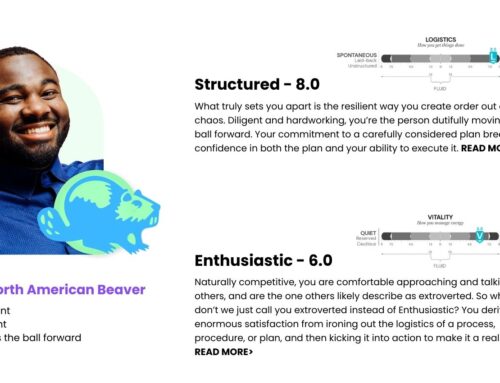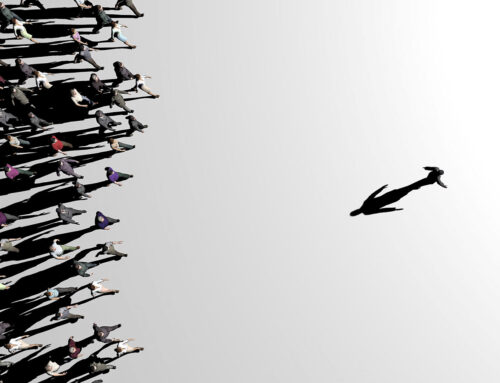What a Choice Mindset Can Teach Leaders
Ever wonder why people in power can come across as unfair and unsympathetic in their treatment of their subordinates? Before you dismiss these individuals as little more than self-absorbed jerks, consider the possibility that a choice mindset is to blame.
In a nutshell, choice mindset refers to the belief that our actions (as well as the actions of others) are the result of our deliberate decisions. Someone with a choice mindset sees human achievement and failure as a product of the decisions we make.
Where things go awry is when individuals with a choice mindset enter the ranks of the powerful – i.e., the wealthy, corporate executives, military leaders, politicians, etc. While their lofty position in the pecking order naturally affords them more flexibility and choices in life, they mistakenly assume subordinates enjoy the same level of freedom.
Consider two parents, one a boss, the other his subordinate. Better pay and a more senior position makes it possible for the boss to afford daycare and determine if and when he works from home. His subordinate, on the other hand, lacks neither of those choices.
In instances when the subordinate is required to work from home, the boss sees that as a choice. If performance issues arise during that remote work stint, the boss not only will come crashing down on the subordinate, he’ll see his subordinate’s failures as evidence that his punishment was warranted and their existing power dynamic legitimate.
And this mindset can be at work in anyone, including those who suddenly find themselves thrust into a position of power.
We’re All Capable of Being Culpable
In a recent study by researchers at the University of California at San Diego, choice mindset was tested across three different scenarios and in every case those in positions of power were more likely to be harsher in their judgments and punishments.
Interestingly, even in instances where the person in power was only placed in that role temporarily as part of the study, the same results occurred: those in power demonstrated less understanding and empathy.
Their study confirmed that “choice-mindset changes how individuals think, feel and behave,” said Yidan Yin, one of the study’s authors. “Compared to low-power people, high-power people are less likely to be aware of others’ constraints. As a result, they assign more blame when people make mistakes or have shortcomings,” Yin said.
And because those in power mistakenly assume their subordinates have the same degree of flexibility and choice, any shortcomings – real or perceived – are proof that the existing power dynamic is legitimate.
A Call to Self-Awareness
For obvious reasons, the inability of those in power to recognize the limitations facing their subordinates can lead to a kind of self-reinforcing feedback loop that reaffirms the unequal power dynamic and the punishments that come with it.
As with so many insights into human psychology, these findings provide those in leadership positions with a path to greater self-awareness and with it new ways of understanding and supporting their subordinates. Doing so will inevitably lead to improved morale, higher levels of engagement, and a stronger sense of trust in an organization’s leadership. Lots of wins there.
This also can be true across any leadership type, include policymakers tasked with creating rules, regulations, and laws that govern the lives of their constituents. “Policymakers are in a position of power and privilege and may be less sensitive to the disadvantages of their constituents,” noted the study’s authors. “This is especially important as we come out of the pandemic when there are big discussions in the political domain on pulling back on unemployment benefits, or rent assistance.”
What a Choice Mindset Can Teach Leaders
Ever wonder why people in power can come across as unfair and unsympathetic in their treatment of their subordinates? Before you dismiss these individuals as little more than self-absorbed jerks, consider the possibility that a choice mindset is to blame.
In a nutshell, choice mindset refers to the belief that our actions (as well as the actions of others) are the result of our deliberate decisions. Someone with a choice mindset sees human achievement and failure as a product of the decisions we make.
Where things go awry is when individuals with a choice mindset enter the ranks of the powerful – i.e., the wealthy, corporate executives, military leaders, politicians, etc. While their lofty position in the pecking order naturally affords them more flexibility and choices in life, they mistakenly assume subordinates enjoy the same level of freedom.
Consider two parents, one a boss, the other his subordinate. Better pay and a more senior position makes it possible for the boss to afford daycare and determine if and when he works from home. His subordinate, on the other hand, lacks neither of those choices.
In instances when the subordinate is required to work from home, the boss sees that as a choice. If performance issues arise during that remote work stint, the boss not only will come crashing down on the subordinate, he’ll see his subordinate’s failures as evidence that his punishment was warranted and their existing power dynamic legitimate.
And this mindset can be at work in anyone, including those who suddenly find themselves thrust into a position of power.
We’re All Capable of Being Culpable
In a recent study by researchers at the University of California at San Diego, choice mindset was tested across three different scenarios and in every case those in positions of power were more likely to be harsher in their judgments and punishments.
Interestingly, even in instances where the person in power was only placed in that role temporarily as part of the study, the same results occurred: those in power demonstrated less understanding and empathy.
Their study confirmed that “choice-mindset changes how individuals think, feel and behave,” said Yidan Yin, one of the study’s authors. “Compared to low-power people, high-power people are less likely to be aware of others’ constraints. As a result, they assign more blame when people make mistakes or have shortcomings,” Yin said.
And because those in power mistakenly assume their subordinates have the same degree of flexibility and choice, any shortcomings – real or perceived – are proof that the existing power dynamic is legitimate.
A Call to Self-Awareness
For obvious reasons, the inability of those in power to recognize the limitations facing their subordinates can lead to a kind of self-reinforcing feedback loop that reaffirms the unequal power dynamic and the punishments that come with it.
As with so many insights into human psychology, these findings provide those in leadership positions with a path to greater self-awareness and with it new ways of understanding and supporting their subordinates. Doing so will inevitably lead to improved morale, higher levels of engagement, and a stronger sense of trust in an organization’s leadership. Lots of wins there.
This also can be true across any leadership type, include policymakers tasked with creating rules, regulations, and laws that govern the lives of their constituents. “Policymakers are in a position of power and privilege and may be less sensitive to the disadvantages of their constituents,” noted the study’s authors. “This is especially important as we come out of the pandemic when there are big discussions in the political domain on pulling back on unemployment benefits, or rent assistance.”



